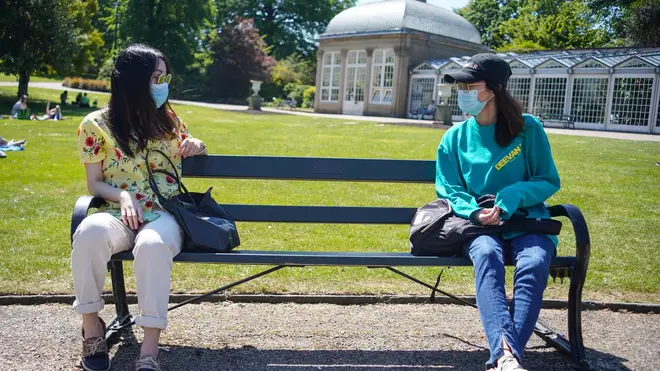
Iain Dale 7pm - 10pm
5 June 2020, 14:38

The number of new coronavirus cases in England has more than halved in the last month, according to a new study.
An average of 53,000 people in England are thought to have had COVID-19 in the period 17 to 30 May, down from 133,000 in the period 3 to 16 May.
The Office for National Statistics study, in conjunction with IQVIA, University of Oxford and UK Biocentre, suggests that there is evidence of a downward trend in the proportion of people testing positive for COVID-19.
It said: "At any given time between May 17 and May 30, we estimated that an average of 0.10% of the community population had Covid-19.
"This equates to an average of 53,000 people in England.
"Modelling of the trend over time shows evidence that the number of people in England testing positive has decreased in recent weeks.
New modelling shows evidence of a downward trend in the number of people in England testing positive for #COVID19 in recent weeks https://t.co/BlkFU2f5ys pic.twitter.com/7xVAuO6zWr
— Office for National Statistics (ONS) (@ONS) June 5, 2020
"There were an estimated 39,000 new Covid-19 infections per week in England
between April 26 and May 30, equating to an incidence rate per week of 0.07 new cases per 100 people."
New analysis from the ONS found that 28 per cent of excess deaths registered between March 7 and May 1 in England and Wales did not involve coronavirus - a total of 12,900 deaths out of 46,380.
Excess deaths refers to the number of deaths that is above the average total for this period in the previous five years.
The non-Covid-19 excess deaths identified by the ONS have occurred mainly in older age groups, particularly for frail elderly people with underlying health conditions.
The ONS said that "undiagnosed Covid-19 could help explain the rise in these deaths".
Listen & subscribe: Global Player | Apple Podcasts | Google Podcasts | Spotify
Figures show that the highest number of excess non-Covid-19 deaths have taken place in care homes, with a weekly maximum of 2,975 of these deaths being registered in the seven days to April 17.
Non-Covid-19 deaths in private homes saw a separate peak in the week ending April 24, when 1,760 were registered.
The ONS said that if patients have been discharged from hospital sooner than they may have been typically, because of pressure on the NHS's resources, this "could have resulted in some deaths occurring in care homes or private homes that would have otherwise occurred in hospital".
It added that the reported lower rates of testing in all settings outside hospitals "could lead to some deaths in other locations involving Covid-19 not having Covid-19 listed on the death certificate as a contributory factor, leading to apparently higher non-Covid-19 excess deaths".
Separately, the fact that deaths related to asthma and diabetes are occurring at a "significantly higher rate compared to the five-year average" could indicate that some people with these conditions are not receiving care fast enough to prevent death taking place, due to extra pressures on the healthcare system.
The ONS added that it is "plausible" that some of these deaths are because undiagnosed Covid-19 had "exacerbated the pre-existing condition".